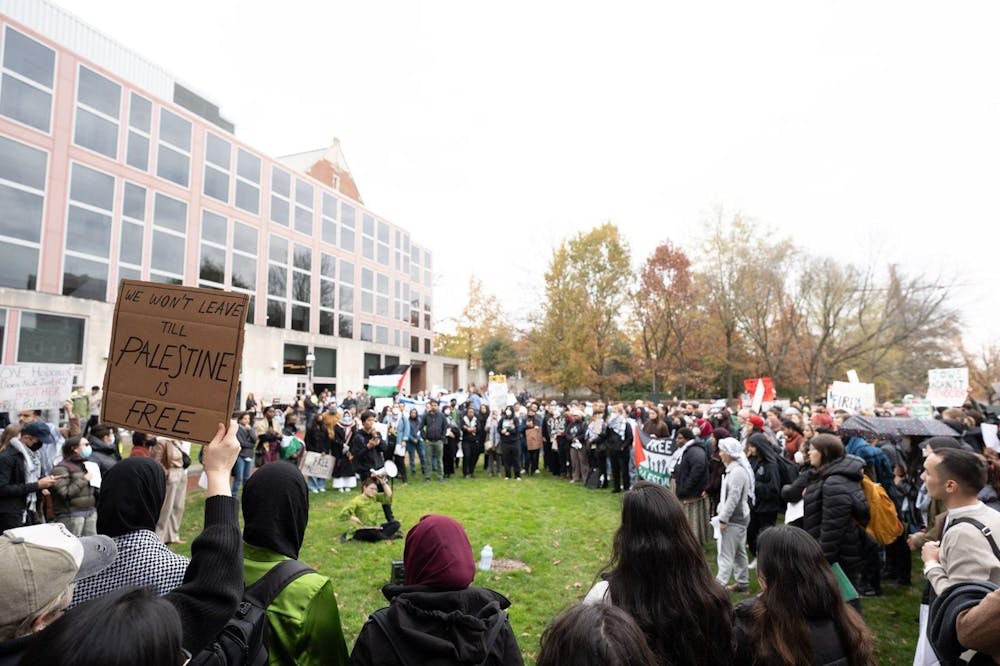The following is a guest submission and reflects the author’s views alone. For information on how to submit a piece to the Opinion section, click here.
In spite of widespread international outrage over the past four months — including South Africa’s well-publicized charge of genocide — Israel has remained unwavering in its violence in Gaza, showing few signs of backing down on its assault of Rafah, endangering over half a million children.
Pro-Israel students are demonizing pro-Palestinian students and activists by conflating criticism of the Israeli government with support for Hamas. This sentiment was reflected on Nov. 8, when a starkly divided scene played out on the field behind Frist Campus Center: a rally for a ceasefire and Palestinian rights on one side, large signs condemning Hamas and Israeli flags on the other. This demonizing rhetoric is nonsensical because the belief that the Palestinian people who are being murdered in the tens of thousands deserve to live is not the same as supporting Hamas. Bombing universities and evacuation paths and killing over ten thousand children are indisputably war crimes.
Campus discourse of the relationship between Israel and Palestine should be grounded in the reality of this conflict’s history. Below, we refute three common arguments proponents of Israel’s actions make on campus.
Anti-Zionism is antisemitism.
This is a commonly heard assertion made to discredit opposition to Israel. It conveniently ignores notable national Jewish activist groups with hundreds of thousands of members like Jewish Voices for Peace and If Not Now, who have been at the forefront of the fight for a ceasefire, from the streets to Capitol Hill. Here at Princeton, the Alliance for Jewish Progressives has notably been a vocal participant in calls for the divestment from Israel.
The narrative that all Jewish people have a self interest in the Zionist project and preservation of Israel ignores the political reality. When criticism of Israel is misconstrued as discrimination against Jews, it trivializes real antisemitism. Benjamin Netanyahu, the prime minister of Israel, has publicly used racist, genocidal rhetoric towards Palestinian people and described this conflict as a “struggle between the children of light and the children of darkness, between humanity and the law of the jungle” in a now deleted tweet. When we criticize Israel, this is what we are criticizing. Identity politics has impeded meaningful discourse by equating criticism of Israel to prejudice against Jewish people. No country should automatically only represent the interests of a single group, simply because they are the majority of the population.
“From the river to the sea” is a call for genocide and the destruction of Israel.

This misconstrued interpretation is a strawman of the phrase’s intent. Policing the semantics of Palestinian students and organizers ignores the pain that many feel from witnessing over 30,000 Palestinians murdered by the Israeli military and how this violence has deepened desires for liberation and peace.
Critics of this phrase on campus have claimed that it calls for violence and genocide. But as Congressional Representative Rashida Tlaib said in response to accusations of antisemitism, “From the river to the sea is an aspirational call for freedom, human rights, and peaceful coexistence, not death, destruction, or hate.” In our view, pro-Palestinian students are not advocating for the genocide of Israelis nor the destruction of the Israeli state. Any mention of this interpretation is simply fear mongering that takes away from our collective understanding of the underlying power imbalance in the past four months of violence.
“Israel has the right to defend itself against terrorism.”
At Princeton, pro-Palestinian rallies have been accused of being a “reminder of the terrorism” directed at Israel by Hamas. But in 2021, thousands of Palestinians peacefully protested Israel’s occupation of the West Bank through the “Great March of Return”, only to be met with an open fire by the IDF that killed hundreds of protestors. This is only a recent act of resistance by Palestinian people, who have been forcefully displaced from their homes in the hundreds of thousands by Israel, never allowed to return. Is the slaughter of innocent civilians engaging in non-violent protest not also terrorism?

This appeal to “combatting terrorism” to justify pro-Israel sentiment inherently benefits those in power. Obviously, the actions of Hamas on Oct. 7 were horrific acts of violence against civilians, but is the withholding of resources to the point of starvation from Gazan citizens not also a form of violence? Before Oct. 7, the structures of control and power instituted by Israel over Gaza were more insidious than they are currently, but they were violent nonetheless. Under conditions of food insecurity, a system of legal apartheid, and the IDF’s brutality, Palestinians lived in an open air prison.
As Princeton students — the world’s future leaders and scholars — we should hold ourselves to a higher standard of accurately learning geopolitical history. Rather than rely on condemnations and moral platitudes, we call on Princeton students to center campus discourse on the actual geopolitics and current events of Israel and Palestine, beginning with the fact that over one percent of Gaza’s population has been murdered.
Ezekiel DouglasRosenthal is a first-year student from Lakeville, Conn. He is a member of the Princeton Alliance for Jewish Progressives. He can be reached at zd8993[at]princeton.edu. Lake Liao is a first-year from Troy, Mich. He can be reached by email at lakeliao[at]princeton.edu.








